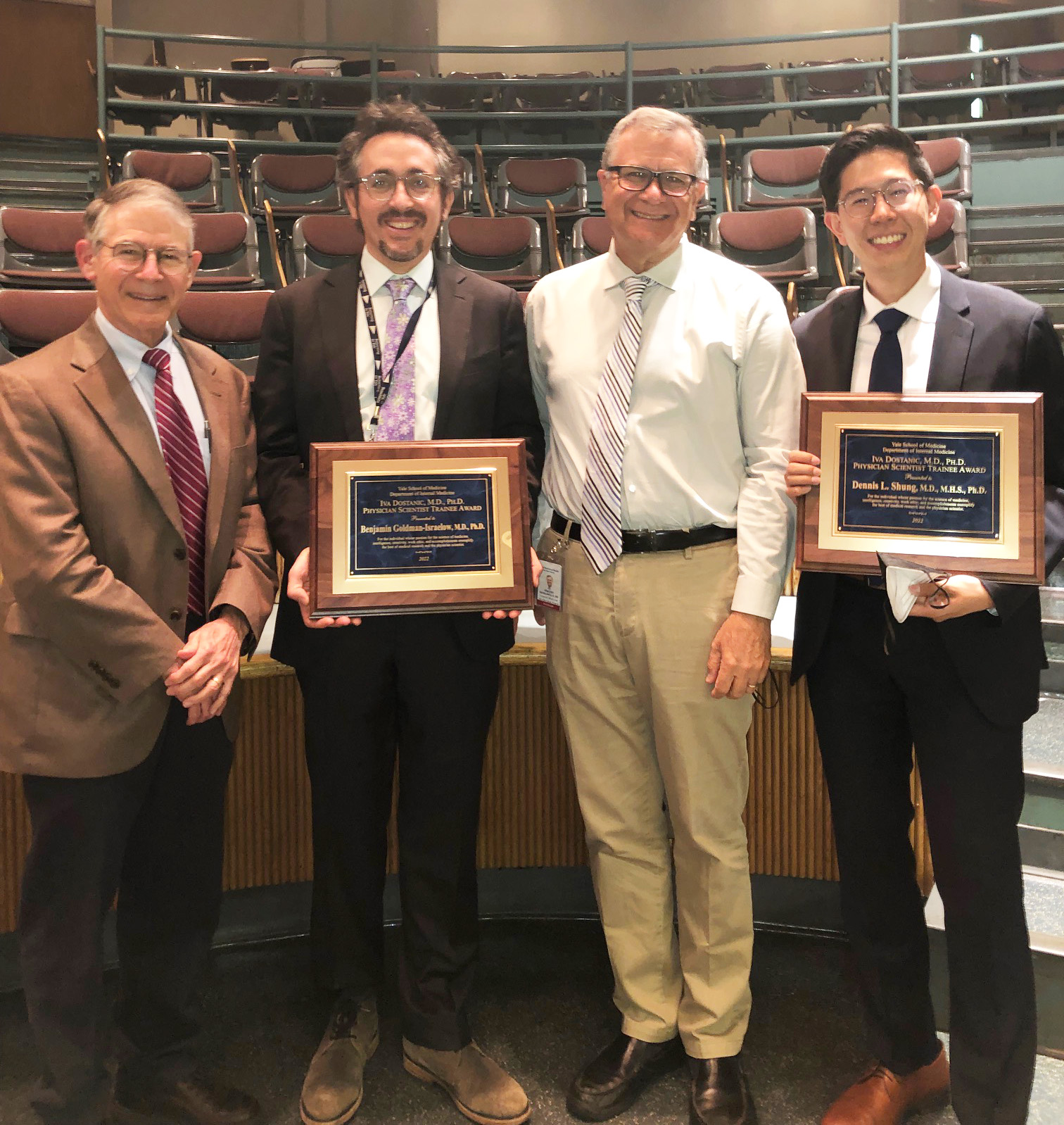Dennis Shung, MD, MHS, PhD, and Benjamin Goldman-Israelow, MD, PhD, were recognized as the 2022 Iva Dostanic, MD, PhD, Physician-Scientist Trainee Award honorees at a Department of Internal Medicine Medical Grand Rounds on June 23, 2022.

The Iva Dostanic Lecture celebrates the life and legacy of Iva Dostanic, a Yale School of Medicine (YSM) resident and research fellow who died of ovarian cancer in 2011, said Peter Aronson, MD, C.N.H. Long Professor of Medicine (nephrology) and professor of cellular and molecular physiology. YSM’s Department of Internal Medicine established the Iva Dostanic, MD, PhD, Physician-Scientist Trainee Award and Lecture to recognize trainees like Dostanic who have a passion for science as well as clinical care. Dostanic died in December 2011, less than a week after receiving the first Iva Dostanic, MD, PhD, Physician-Scientist Trainee Award. Dostanic’s parents, Dragana and Predrag Dostanic, have dedicated their lives to supporting physician-scientist trainees in YSM’s internal medicine department. They attended the morning lectures virtually.
As Dostanic pursued her passion for medicine, she found much joy along the way, Aronson said. I hope each of you find similar joy in your work, he told Shung and Goldman-Israelow.
Goldman-Israelow was introduced by Barbara Kazmierczak, PhD, MD, the Gustavus and Louise Pfeiffer Research Foundation MD-PhD Program Director and professor of medicine (infectious diseases) and of Microbial Pathogenesis. He shared how impressed he had been when he attended the Dostanic lecture six years ago as a Yale intern, and how humbled he was to be an honoree.
Goldman-Israelow’s lecture, “Prime and Spike: A Novel Vaccination Strategy for Inducing Mucosal SARS-CoV-2 Immunity,” discussed the research involved in developing a nasal spray for COVID-19 that could potentially provide enhanced protection and decreased SARS-CoV-2 transmission. Goldman explained that both host and virological factors contribute to reduce current vaccine effectiveness. Prime & Spike addresses these issues by leveraging existing memory cells to stimulate robust mucosal T and B cell immunity in the upper and lower respiratory tract. In preclinical trials, the method completely protected mice from lethal SARS-CoV-2 infection with reduced lung pathology and reduced upper and lower respiratory track viral load. It also reduced viral shedding and transmission, he said.
Goldman-Israelow acknowledged his adviser and mentor, Akiko Iwasaki, PhD, for “making science an exciting endeavor and keeping everyone interested.” Iwasaki is the Sterling Professor of Immunobiology and Professor of Dermatology and of Molecular, Cellular, and Developmental Biology and of Epidemiology (Microbial Diseases) and Investigator, Howard Hughes Medical Institute. Goldman also thanked Erol Fikrig, MD, chair of the department of internal medicine’s infectious diseases section, and Tianyang Mao, MSc, of the Iwasaki Lab.
Shung’s presentation, “Human+AI in Medicine,” began after an introduction by Loren Laine, MD, chief of the department of internal medicine’s digestive diseases section who shared the news that Shung will be joining the ladder track faculty as an assistant professor on July 1, 2022.
Shung began his lecture by commenting on how many more -- and sicker -- patients there are for physicians to care for, and ever more data to review. “So much data, so little time,” he said.
Using artificial intelligence (AI) and machine learning can enhance human presence in healthcare by providing tools to help prioritize patient care, as well as to follow patients, he said. He defined AI as any technique that allows computers to mimic human behavior, and machine learning as the ability of computers to learn without explicitly being programmed.
His research focuses on gastrointestinal bleeding, the most common cause of GI-related hospitalizations in the U.S. He explained how AI and machine learning techniques outperform clinical risk scores in predicting hospital-based care for upper-gastrointestinal bleeding, and that using AI can result in more low-risk patients being identified and discharged from the hospital. Shung also explained his approach to combat bias, sharing how additional research into bias and disparities can mitigate algorithmic harm.
Shung was accompanied by his family, whom he thanked for their support and encouragement. He also thanked Laine, “who taught me what excellence means.”